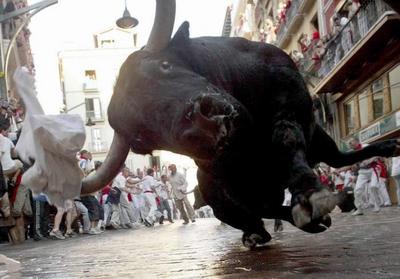Pass the hors d'oeuvres, please.
July 11, 2005
Our House of Lords
By Michael Barone
The Supreme Court is our House of Lords. It is a deliberately, necessarily unrepresentative body of government that from time to time makes binding decisions on public policy -- some of which spark great protest.
The House of Lords, curiously, is also Britain's highest appellate court, although in fact cases are judged only by certain members called Law Lords. But the decisions of the House of Lords, like those of the Supreme Court, are final. The difference is that the House of Lords has traditionally not been able to declare laws unconstitutional -- not so surprising in a nation that does not have a written constitution. The U.S. Supreme Court, though it is nowhere stated in our written Constitution, can.
Today, the Supreme Court is much more powerful than the House of Lords. Since 1911, the lords have been able only to delay legislation, not to defeat it. The Supreme Court has been declaring laws unconstitutional since 1803. Power is also much more concentrated in the Supreme Court. The House of Lords has 500-some voting members, the Supreme Court only nine, serving for as long as they wish.
That can be a long time. Justice Sandra Day O'Connor put in 24 years on the court; Chief Justice William Rehnquist, 33.
The Supreme Court has long made important public policy decisions. In the early 19th century, under Chief Justice John Marshall, it helped establish the legal rules that made possible America's bounteous economic growth.
In 1857, it attempted to settle the burning political question of the legality of slavery in the territories and instead plunged the nation toward civil war. In the early 20th century, the Court struck down laws limiting work hours and child labor, and created a political backlash that resulted in a reversal of those decisions in the 1930s and 1940s.
In 1954, it reversed itself and ruled that racial segregation in schools was unconstitutional. In 1973, after 16 states had already liberalized their abortion laws and others were on the verge of doing so, it legalized abortion everywhere in the United States.
More recently, it has struck down attempts to prohibit gruesome "partial-birth" abortions. It has ruled that the First Amendment protects student armbands, nude dancing and flag burning, but not the right to spend money to attack incumbent officeholders in the run-up to federal elections.
Unsurprisingly, Supreme Court nominations have become politically controversial. Liberals have tried to block the nominations of those they think might overturn decisions they like. Conservatives have noted with dismay that nominees who were considered conservative become, some time after confirmation, staunch liberals.
This is partly a function of the unrepresentativeness of the court. Its members are drawn from a small segment of society -- elite lawyer -- and tend to crave the good opinion of editorial writers, law school professors and Georgetown hostesses -- all liberal constituencies.
Each justice is provided with four 20-something law clerks who are recent graduates of elite law schools; the late Justice Harry Blackmun, as Linda Greenhouse's recent book shows, became something of a creature of his left-leaning clerks. It's no surprise that over the past half-century, lots of justices have moved left and few or none have moved right.
Until Tony Blair's 1999 reforms, the House of Lords had the opposite institutional bias: Its hereditary peers made it eternally conservative. Blair's reforms reduce the number of voting hereditary peers to 90, and they are now outnumbered by life peers -- people of distinction from a variety of fields -- and so no party has a majority. Interestingly, this has made the Lords more willing to disagree with the Commons.
In the United States, justices have typically felt little compunction about overturning laws and making public policy, and have been rewarded with copious praise when they do.
Conservatives are hoping that George W. Bush will appoint justices immune to the temptations that have moved their predecessors to the left. They fear that the man who may be the leading candidate, his attorney general, Alberto Gonzales, is one who can't resist.
Liberals hope for just such a person and will oppose anyone they think won't succumb. That's what's at the heart of the fight over the composition and character of our House of Lords.
© Copyright 2005 US News & World ReportDistributed by Creators Syndicate

















<< Home